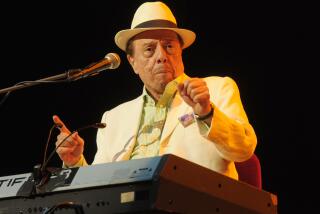Environmentalist Pays With His Life
- Share via
When I got the message, my mind was not on murder. In the intense heat, humidity dripped down the windshield of the truck. In the dark night of the Brazilian Amazon, the words relayed by my friend were startling: “Tell Cousteau if he ever comes back here, he’ll never get out alive.”
At first I thought I hadn’t heard him correctly. But it was shockingly true. I had received a warning from the cocaine underworld--an underworld eager to protect its coca fields in the Amazon.
Apparently, I had become a marked person because our expedition teams were making inquiries about the Amazon cocaine trade. At that moment, the reality I had been vaguely sensing for months pierced the curtain of jungle: The lawless want the Amazon, at any price.
The threat to my life dissipated. But Francisco (Chico) Mendes Filho was not so fortunate.
Mendes made his living tapping latex from trees. During his long career of environmental activism, he helped unionize rubber tappers and ranch hands in the wild Brazilian Amazon state of Acre and served on his local town council.
He vehemently protested the clearing of dense Amazon forest, not only because deforestation meant the destruction of rubber trees and his livelihood, but also because he deeply cared about the future of the region. In 1987, he even traveled to Washington to try to persuade the Inter-American Bank to cancel a loan that would enable Brazil to pave a vast highway through the heart of virgin Acre jungle. According to a spokesman for the bank, he was instrumental in persuading the bank that indigenous Amazonian cultures and large areas of forest needed better protection. Thanks largely to the efforts of Mendes, the loan was held in abeyance until the bank could be satisfied that environmental concerns were being properly addressed. As of late February, 1989, the loan remained frozen.
In working to restructure the loan, Mendes dreamed instead of international financing for projects that would wisely use the Amazon--such as mass cultivation of medicinal plants, nuts and other native crops.
By September, 1987, there had already been at least five threats on Chico Mendes’ life. He was a particular nuisance to Amazon cattle ranchers, who clear-cut vast tracts of trees to graze cattle for beef to be exported, mostly to developed countries.
On Dec. 22, 1988, lawlessness finally had its way. The 44-year-old Mendes was assassinated by a band of cattle ranchers whose operations he had long opposed. Several suspects were arrested, one rancher’s son confessed to the shooting, and the search continues for others.
But arrests alone would not close the case. As a friend in Brazil said: “Big people and big money killed Chico Mendes.”
As I traveled through the Amazon, I was always amazed at the grandeur of the countless rivers, always humbled by the vastness of the green sea of trees. I was always aware that in this primeval forest, in supposedly savage wilderness, a natural order prevailed. It is modern society that seems uncivilized, noisy and destructive.
Of course, I too appreciate progress. It is indeed helpful to be able to call New York or Paris, or even Calypso from a direct-dial phone in a dusty Amazonian frontier town. Development can bring creature comforts to the wild. But in the Amazon, the lust for profit has brought wild development.
Chico Mendes fought this Amazon fever. He tried to stop unbridled deforestation, but the stakes had climbed too high. He was murdered because he had become an international figure--a hero to those who want to protect the resources of our planet--and because his effectiveness was taking money out of pockets.
His death was a terrifying reminder that those who stand in the way of the rapacious risk their lives.
Others have been killed and many more intimidated for trying to stand in the way of the anarchy that modern man has brought to Amazonia. Had Mendes not crusaded publicly, his death would have gone unnoticed.
It will be shameful if environmentalism has to work “underground” to keep its leaders alive, if environmentalists have to wear hoods and go nameless lest they be shot and put out of the way; if anyone whose voice grows strong enough to be heard by the powerful has to go into hiding.
When I heard of Chico Mendes’ death, I felt it could have been me. Through his murder, I felt morally mobilized. Surely I am not alone.
Mendes will be replaced and his movement will continue. An idea cannot be shot. The killers pulled the trigger on Chico Mendes, but greed and ignorance made the gun. Mendes clearly understood that we have only one Amazon forest, one water system, one habitable globe. So that his death shall not have been for nothing, his vision must remain ours.
More to Read
Sign up for Essential California
The most important California stories and recommendations in your inbox every morning.
You may occasionally receive promotional content from the Los Angeles Times.










